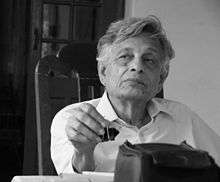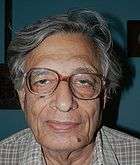Irfan Habib
Irfan Habib (born 1931) is an Indian historian of ancient and medieval India, following the approach of Marxist historiography. He is well known for his strong stance against Hindutva and Muslim communalists.[2] He has authored a number of books, including Agrarian System of Mughal India, 1556–1707.
Irfan Habib | |
|---|---|
 Irfan Habib – at his residence in Aligarh | |
| Born | 12 August 1931 67th |
| Citizenship | Indian |
| Alma mater |
|
| Awards | |
| Scientific career | |
| Fields | History |
| Doctoral advisor | C.C. Davies |
Early and personal life

Irfan was born in an Indian Muslim family, the son of Mohammad Habib, a Marxist historian and ideologue belonging to the Communist Party of India (Marxist), by his wife Sohaila Habib (née Tyabji). Irfan's paternal grandfather was Mohammad Naseem, a wealthy barrister and member of the Congress party, and his maternal grandfather was Abbas Tyabji, sometime Chief Justice of the High Court of Baroda princely state.[3]
Irfan's wife Sayera Habib (née Siddiqui) was Professor of Economics at Aligarh Muslim University (AMU).[4] The couple have three sons and a daughter.
Academic
After he returned from Oxford he joined AMU as a member of the faculty. He was Professor of History at Aligarh from 1969–91. He is presently appointed as Professor Emeritus at the Department of History of the AMU. He delivered the Radhakrishnan Lecture at Oxford in 1991. He is an Elected Corresponding Fellow of the British Royal Historical Society since 1997.[3]
Habib has worked on the historical geography of Ancient India, the history of Indian technology, medieval administrative and economic history, colonialism and its impact on India, and historiography.[3]
Amiya Kumar Bagchi describes Habib as "one of the two most prominent Marxist historians of India today and at the same time, one of the greatest living Marxist historians of India between the twelfth and eighteenth centuries."[5]
Positions
He was Coordinator/Chairman of the Centre for Advanced Studies, AMU from 1975–77 and 1984–94. He was Chairman of the Indian Council of Historical Research during 1986–90.[6] He was the general secretary, Sectional President, and then the General President of the Indian History Congress (1981).[3]
Philosophical and political views
Habib identifies as a Marxist and uses Marxist historiography in his work.[7]
Habib has also written books about Vedas and Vedic age, and he considers the Vedas to be a good historical source, which describes transmission in a priestly culture, that valued faithfulness. He further lays out the reasons that the texts were orally transmitted for hundreds of years, then they were finally written down.[8]
Habib had a sustained commitment to secularism. He led the historians at the Indian History Congress of 1998 who moved a resolution against the "saffronisation" of history.[9] He has said that the BJP government at the Centre which was in power from 1998–2004, especially the MHRD Minister himself, were responsible for inventing facts and dates to suit their interpretation of Indian history.[10] To counter Irfan Habib, Murli Manohar Joshi released a book which rebuts the history of what the former minister calls '‘Habib & Co'’.[11][3]
Honours
- Among the first six Jawaharlal Nehru Fellowships, 1968.[12]
- Watumull Prize of American Historical Association, 1982. (Jointly with Tapan Raychaudhuri).[1]
- Padma Bhushan, 2005.[13]
- Ibn Sina Memorial Lecture, 2009 (Ibn Sina Academy of Medieval Medicine and Sciences).
- Yash Bharti, 2016[14][15][16]
Controversy
In December 2019, the Governor of Kerala Arif Mohammed Khan accused Irfan Habib of disrupting his speech at the India History Congress session held at Kannur University, Kannur.[17]
KK Mohammed said in his autobiography titled Njan Enna Bharatiyan (I an Indian) The action committee held several meetings under the leadership of Irfan Habib, the then chairman of the Indian Council of Historical Research. "The Babri issue would have been settled long ago if the Muslim intelligentsia had not fallen prey to the brain washing by the Leftist historians. A set of historians including Romila Thapar, Bipin Chandra and S Gopal argued that there was no mention of the dismantling of the temple before 19th century and Ayodhya is Bhudhist-Jain centre. They were supported by historians Irfan Habib,RS Sharma, DN Jha, Suraj Ben and Akthar Ali," he said. [18]
Irfan Habib and Shrimali, given a project on ‘Dictionary of Social, Economic and Administrative Terms in Indian/South Asian Inscriptions’ under ICHR which was started in 1989 with the mandate to bring out nine volumes in 15 years. This project has so far soaked up more than Rs 42 lakh. They have not submitted a single manuscript. ‘Medieval Sources Project’ under ICHR Irfan Habib was appointed to translate Akhbarat-e-Aurangzeb Rs 27,000 allocated for project no volume has been published. [19]
Selected publications
- Books Authored
- The Agrarian System of Mughal India 1556–1707. First published in 1963 by Asia Publishing House. Second, extensively revised, edition published in 1999 by Oxford University Press.
- An Atlas of the Mughal Empire: Political and Economic Maps With Detailed Notes, Bibliography, and Index. Oxford University Press, 1982
- Essays in Indian History – Towards a Marxist Perception. Tulika Books, 1995.
- The Economic History of Medieval India: A Survey. Tulika Books, 2001.
- Medieval India: The Study of a Civilization. National Book Trust, 2008.
- People's History of India – Part 1: Prehistory. Aligarh Historians Society and Tulika Books, 2001.
- People’s History of India Part 2 : The Indus Civilization. Aligarh Historians Society and Tulika Books, 2002.
- A People's History of India Vol. 3 : The Vedic Age. (Co-author Vijay Kumar Thakur) Aligarh Historians Society and Tulika Books, 2003.
- A People's History of India – Vol 4 : Mauryan India. (Co-author Vivekanand Jha) Aligarh Historians Society and Tulika Books, 2004.
- A People's History of India – Vol 28 : Indian Economy, 1858–1914. Aligarh Historians Society and Tulika Books, 2006.
- The National Movement: Studies in Ideology & History
- Books Edited
- The Cambridge Economic History of India – Volume I: 1200–1750 (co-editor Tapan Raychaudhuri)
- UNESCO History of Civilizations of Central Asia, Vol 5 : Development in contrast: from the sixteenth to the mid-nineteenth century. (Co-editors Chahryar Adle and K M Baikapov)
- UNESCO History of Humanity, Vol 4: From the seventh to the sixteenth century. (With various co-editors).
- UNESCO History of Humanity, Vol 5: From the sixteenth to the eighteenth century. (With various co-editors).
- The Growth of Civilizations in India And Iran
- Sikh History from Persian Sources
- Akbar and His India
- India – Studies in the History of an Idea
- State & Diplomacy under Tipu Sultan
- Confronting Colonialism
- Medieval India – 1
- A World to Win – Essays on the Communist Manifesto (co-editors Aijaz Ahmed and Prakash Karat)
References
- "Discontinued Awards - AHA". www.historians.org.
- Historian: Prof Irfan Habib outlookindia.com. Magazine | 23 April 2007. Retrieved 15 January 2013
- Habib, Irfan (2002). The Making of History: Essays Presented to Irfan Habib. Anthem Press. p. 1. ISBN 9781843310389.
- The Agrarian System of Mughal India, Oxford University Press, 2004, ISBN 0-19-565595-8, Preface xv
- Amiya Kumar Bagchi. Writing Indian History in the Marxist Mode in a Post-Soviet World, Review of Essays in Indian History: Towards a Marxist Perception, Social Scientist, 1996.
- "Indian Council of Historical Research, New Delhi, India". ichr.ac.in.
- Mitra, Ashok (14–27 October 2000). "A tribute to Irfan Habib". Frontline. Retrieved 9 April 2007.
- The Clash Within: Democracy, Religious Violence, and India's Future, p.271, Martha Nussabaum, Harvard University Press
- "Singh, Bajinder Pal, 1998, Historians likely to resist'saffronisation', The Indian Express".
- "Government trying to invent history, says Habib"
- NCERT brings out book to counter 'Habib & Co', 2003, The Indian Express
- "Official list of Jawaharlal Nehru Fellows (1969-present)". Jawaharlal Nehru Memorial Fund.
- "Archive News". The Hindu.
- "प्रो. इरफान हबीब होंगे यश भारती से सम्मानित- Amarujala".
- http://www.dailypioneer.com/state-editions//cm-presented-yash-bharati-awards.html
- "Eminent achievers to get Yash Bharti Award today - Times of India".
- https://timesofindia.indiatimes.com/india/kerala-governor-says-eminent-historian-irfan-habib-tried-to-disrupt-his-speech/articleshow/73010359.cms
- https://www.firstpost.com/india/left-historians-connived-with-extremists-mislead-muslims-on-babri-issue-says-archaeologist-in-new-book-2592188.html
- https://books.google.co.in/books/about/Eminent_Historians_Their_Technology_Thei.html?id=N6NLDQAAQBAJ&redir_esc=y
External links
| Wikiquote has quotations related to: Irfan Habib |
- Note Towards a Marxist Perception of Indian History, The Marxist, Oct-Dec 2010.
- "Delhi Historians Group's Publication "Communalization of Education: The History Textbooks Controversy", A report in 2002, New Delhi: Jawaharlal Nehru University, India
- Selected publications of Irfan Habib
- The Nation That Is India – an article by Irfan Habib, the little magazine, 2003.
- Review of The Making of History: Essays Presented to Irfan Habib
- 2001 Interview of Irfan Habib on Rediff
- Historian: Prof Irfan Habib outlookindia.com. Magazine | 23 April 2007.